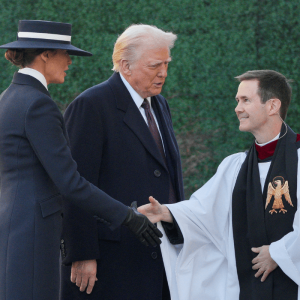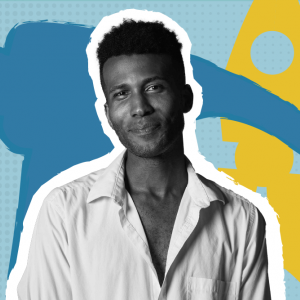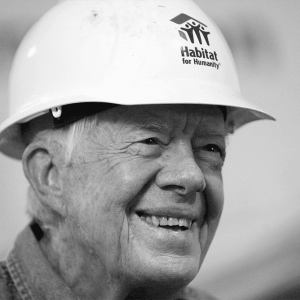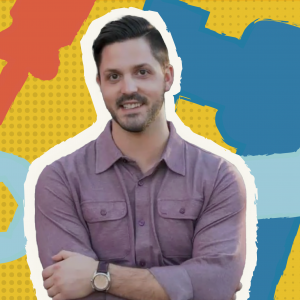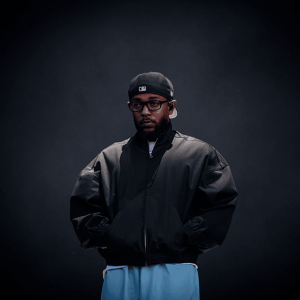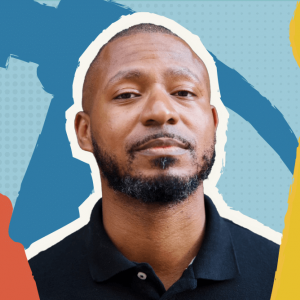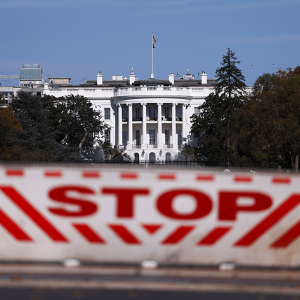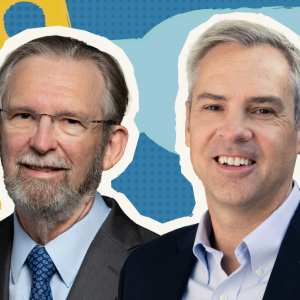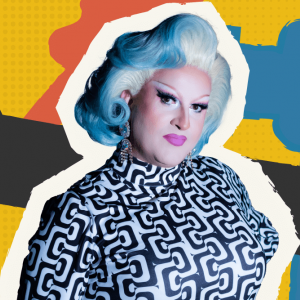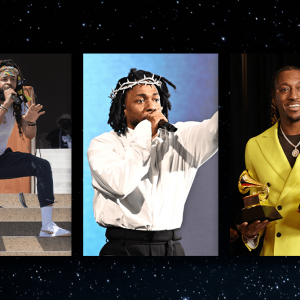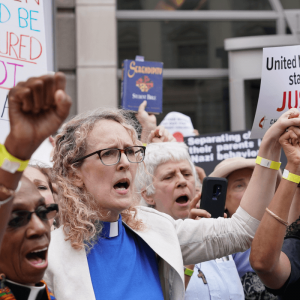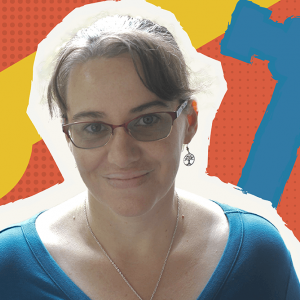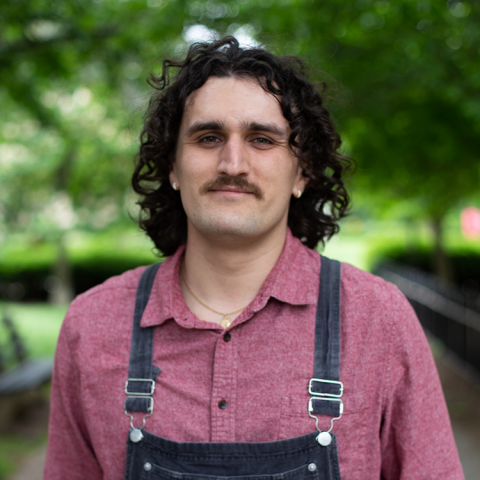
Mitchell Atencio is the senior associate news editor at Sojourners. He first served as a contract reporter for Sojourners in 2020.
Mitchell believes his role as a journalist is to ask compelling questions of the right people and to tell stories that impact the actions of readers. He loves writing stories of the radical or unique — especially within faith. Before joining Sojourners, Mitchell was a reporter in Kirkland, Wash. At Arizona State University he was a passionate and dedicated member of the award-winning, independent, student-newspaper The State Press. He also graduated with a degree in journalism and mass communications, but he doesn’t care as much about that part.
Although he didn’t stay long enough, Mitchell is proud to have been born in Atlanta and dreams of returning.
In journalism and elsewhere, Mitchell advocates for the physical medium. He is a vinyl record collector; a film photographer who shoots, develops, and scans his own film; a magazine subscriber; and a fan of writing letters on the family typewriter. In his spare time, he reads liberation theology, practices Zen, watches a lot of tennis, rants about the evils of pickleball, and makes coffee with a variety of methods. Mitchell is discalced out of religious commitment; he concedes it probably makes him a hippie.
Posts By This Author
Trump Attends ‘Nonpartisan’ Service at Church He Once Used for Photo-Op
Rev. Robert W. Fisher, the rector of the church, told Sojourners in an email before the service that the church was making a concerted effort to return the service to its traditional roots. “The service is meant to be centered on God and humility before the almighty, and to be a call to ‘the better angels of our nature’ for those who are entering into a new season of service,” Fisher wrote in an email.
Black Christian Nationalism and the Search for Utopia
Digging through the basement of the Bishop Payne Library last year, I came across a book titled Black Christian Nationalism.
I laughed, snapped a photo to send it to my friend and co-editor Josiah, and kept on looking for the book I had meant to find. Josiah and I joked about how the book might confound liberal Christians who are overly focused on rooting out “white Christian nationalism” without clearly defining what that phrase actually means, considering whether it's a problem in their own congregations, or listening to good-faith criticisms of their efforts. But I couldn’t stop thinking about the book. Written by Albert B. Cleage, Jr., a pastor from Detroit, it is a provocative proposal that drew from separatist politics and liberation theology in the quest for the freedom of Black people.
Jimmy Carter, ‘Born-Again’ President, Humanitarian, Dead at 100
“Jimmy Carter’s importance to faith and public life was reintroducing into the public square the principles that animated nineteenth-century evangelicals: concern for the poor, racial equality, peacemaking, human rights and equality for women,” Randall Balmer, professor of religion at Dartmouth told Sojourners. “He did so as an avowed and unapologetic Baptist, which means that he respected the First Amendment and the separation of church and state.”
Why Does Religion Journalism Matter to Democracy? Ask a Texas Reporter
What I’ve most appreciated about Downen is that investment in community. To report on abuse in the SBC, Downen had to earn the trust of everyone from powerful, complementarian pastors to radical, queer exvangelicals. His reporting, as we discussed below, is focused on impacts of power and policy instead of being driven by personalities.
In our interview, we discussed how anti-democracy organizing and Christian sex abuse overlap, what reporters need from their communities, and why he treats religious organizations as institutions with power.
Mason Mennenga Is More Than the Internet’s Crass Youth Pastor
If you’ve encountered Mason Mennenga online, it’s likely due to one of his viral tweets.
Gems like “bible college girls are like ‘marriage is so hard’ yeah, you married a 19-year old evangelical man” and “christians will name their kids after old testament prophets and then are shocked that their kids eventually speak out against injustices.” Occasionally, he dunks on a conservative personality, or he becomes the punching bag for conservative voices frustrated by his progressive theology.
But Mennenga is more than a social media account. He hosts two podcasts, writes about theology and culture, and works as director of admissions at United Theological Seminary of the Twin Cities.
Kendrick Lamar Claims Salvation for Satan on ‘GNX’
Since his critically acclaimed album, To Pimp a Butterfly, Kendrick Lamar has been wrestling with the devil. But on GNX, his surprise album released last Friday, Lamar stops wrestling and writes a reconciliation between Satan and God.
Theologian Robert Monson Wants a Softer Social Justice
I’ve followed Robert Monson’s work for years. Monson is a writer and theologian who focuses on Black theology, contemplation, and disability. He is also one of the first people outside my direct orbit to encourage my writing (not just my reporting), and I’ve always found him to be encouraging, joyful, and thoughtful.
Lately, as I have been reading Monson’s work, I’ve found that he is becoming rather soft. Now, before you think those are fighting words, I’ve thought this because it’s the term that Monson uses to describe himself and his aspirations as a man. He sees softness as an ethic to live into, a way of honoring his personhood and the personhood of others.
Faith and Justice Leaders On Facing a Second Trump Term
Trump’s campaign was marked by racist and misogynistic rhetoric, promises of authoritarian tactics including dramatic expansion of executive power and retribution for his political rivals, as well as policies that appealed to the anxieties of conservative religious communities, especially Christians.
As faith and justice leaders absorbed the news of a second Trump term, many pointed to the importance of fostering and caring for self and neighbor while figuring out what to do over the next four years.
Kristin Kobes Du Mez: Christian Patriarchy and Christian Nationalism Are Intertwined
You might think that the people who most fundamentally believe in humanity’s fallen, sinful nature — Calvinists — would also be the most reticent to concentrate power in a small sect of humans.
But often, as Kristin Kobes Du Mez told me in our interview, Calvinists are one of the Christian groups on the front lines of movements where power is concentrated in singular leaders, singular expressions of Christianity, or singular heads-of-households. Kobes Du Mez, a historian at Calvin University , finds this baffling, but can’t deny that the movements are linked. As she sees it, Christian patriarchy, Christian nationalism, and anti-democracy movements are connected by their approach to power.
In a new documentary short, For Our Daughters, Kobes Du Mez and director Carl Byker address the connection of these movements through the stories of sexual abuse victim-advocates: Rachael Denhollander, Cait West, Christa Brown, and others tell the stories of how sexual abuse was allowed, ignored, or covered-up in their communities while analyzing what Christianity has to say about it.
A Leading Bible Scholar On Repenting for His Non-Affirming Theology
“Some people out there in the readership are all in a tizzy that ‘Richard Hays has changed his mind! He’s changed sides! He’s not on our team anymore!’ They think this is some kind of a radical reversal. In spite of what he wrote in the first book, [The Widening of God’s Mercy] is consistent with the man that I had grown up with and known my entire life.”
Flamy Grant Pushes the Boundaries of Christian Music — and Drag
Flamy Grant called in to her morning interview after participating in a day-long silent retreat. Well, not a silent retreat exactly — it was a vocal rest.
After spending the last year touring the U.S. off the success of her album, Grant, who prefers to use her stage name in interviews, needed to rest her voice. Since her rise to Christian music stardom — or infamy, depending on how one feels about a drag queen topping the Christian charts — she has performed in bars, clubs, and churches spreading the good news in glitter.
A Speech on Justice Criticized Israel; the Global Evangelical Conference Apologized
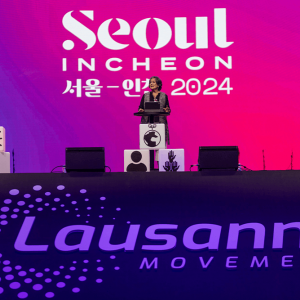
Ruth Padilla DeBorst delivers he plenary speech on “justice,” which the Lausanne Movement would later apologize for, at the Fourth Lausanne Congress in Incheon, South Korea, on Sept. 23, 2024. Photo courtesy the Lausanne Movement. Photo credits for the Lausanne Congress: Michael Bode, Gjermund Oystese, MaryChris Lajom, Grace Snavely, Matthew Lauber, Altin Serani, Jaqueline Baisi, Gersham Girum
Ruth Padilla DeBorst told her audience: “There is no room for indifference toward all who are suffering the scourge of war and violence the world round, the uprooted and beleaguered people of Gaza, the hostages held by both Israel and Hamas and their families, the threatened Palestinians in their own territories, all who are mourning the loss of loved ones.”
Less than 48 hours later, the director of the Fourth Lausanne Congress emailed all attendees, issuing a lengthy apology for Padilla DeBorst’s speech.
Why Did Kendrick Lamar Mention Lecrae and Dee-1 on New Single?
Following up his overwhelming victory in a rap battle with Drake earlier this year, and the news that he would perform at Super Bowl LIX next February, Kendrick Lamar dropped a surprise single last night, mentioning Christian rappers Lecrae and Dee-1 in the song.
Harris-Walz Campaign Hires Veteran Faith and Justice Organizer To Direct Outreach
“You do not want to be beholden to anything but God and your moral values,” Butler told Sojourners. “If I see the Democratic Party running astray from that, then I will criticize them. If they ever became a party of violence and mayhem and chaos, like the Republican Party has become, I would pray to God that I have the courage that so many ‘Never Trump’ Republicans have had. Stepping out in the crowd is an exceptionally hard thing to do.”
Abby Olcese Watches Movies ‘Devotionally’ — and Hopes You Will Too
In her forthcoming book, Films for All Seasons: Experiencing the Church Year at the Movies, Abby Olcese guides the church through the liturgical season via spiritual reflection on movies. Rather than tell readers how a movie is to be interpreted, Olcese guides participants on watching, considering, and discussing 27 films, each aligned with the liturgical calendar.
Raising Kids Who Can Navigate Our Chaotic Future
Over the course of my life, I have been part of political communities that placed high emphasis on the perceived future of hypothetical children.
On the Right, “think of the children” is at the forefront of the movements to end abortion and diminish protections for LGBTQ+ people. On the Left, you’ll hear the same rally cry for movements that aim to reduce climate change or increase gun control. The invocation of children holds serious power. It makes us step outside our own self-focused considerations and instead wonder about a group with minimal power and autonomy.
Meet Vice President Kamala Harris’ Pastor, Civil Rights Leader Amos C. Brown
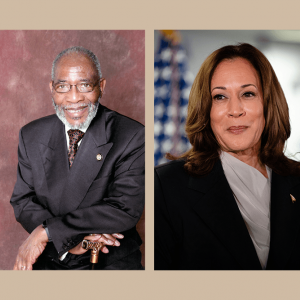
A composite of Rev. Amos C. Brown and Vice President Kamala Harris. Photo of Brown courtesy Third Baptist Church in San Francisco. Photo of Harris looking on on as she speaks at her Presidential Campaign headquarters in Wilmington, Del., July 22, 2024. Erin Schaff/Pool via REUTERS. Composite by Mitchell Atencio/Sojourners
Then, after the service, Brown received a phone call from another member who was absent that Sunday: Vice President Kamala Harris, who was preparing to run a very different type of race.
“She said to me, ‘Pastor, I called because I want you to pray for me, [my husband] Doug, this country’ — and finally she said — ‘and the race I am intending to run for president,’” Brown told Sojourners on Monday. “We exchanged pleasantries, I congratulated her because she’ll be a great president, and we had prayer. She was so gracious and thankful that I took the time.”
WNBA Star Layshia Clarendon Is Keeping the Faith and Breaking Binaries
“To me being Christian means f---ing s--- up,” Layshia Clarendon told ESPN’s Katie Barnes. “That’s what Jesus came to do. It means disrupting and fighting for the most marginalized people.” During the 2020 WNBA season, they helped lead players in protesting police violence against Breonna Taylor and other Black women. Clarendon helped launch the WNBA’s Social Justice Council, alongside players like Sydney Colson, Breanna Stewart, Tierra Ruffin-Pratt, A’ja Wilson, and Satou Sabally. Clarendon signed on to the Athletes for Ceasefire in Gaza, and they launched a foundation to provide grants that help transgender people access health care and other services.
Why Libraries Are Crucial to Faith and Justice Movements
In recent years, the work of librarians has been sucked into the center of the “culture wars” as fascist and authoritarian movements in the U.S. attempt to censor materials, especially about queerness and racial justice. Meanwhile, justice movements have recognized how libraries are a shining example of public-funded community goods.
Leaders Pray for Trump, Peace, and Democracy After Assassination Attempt
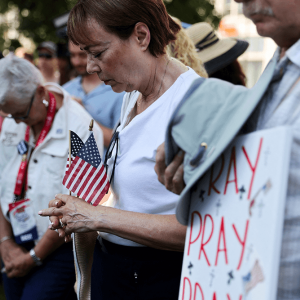
Supporters of former President Donald Trump attend a prayer vigil hosted by Turning Point Action near the venue for the Republican National Convention, at Zeidler Union Square in Milwaukee, Wisc., July 14, 2024, the day after shots were fired at a Trump rally and he was injured in Butler County, Penn. REUTERS/Jeenah Moon
After former President Donald Trump was shot in the ear during a campaign rally on Saturday, faith leaders expressed their disavowal of political violence, reflections on how to reduce polarization, and a desire for other forms of violence to be taken seriously.
